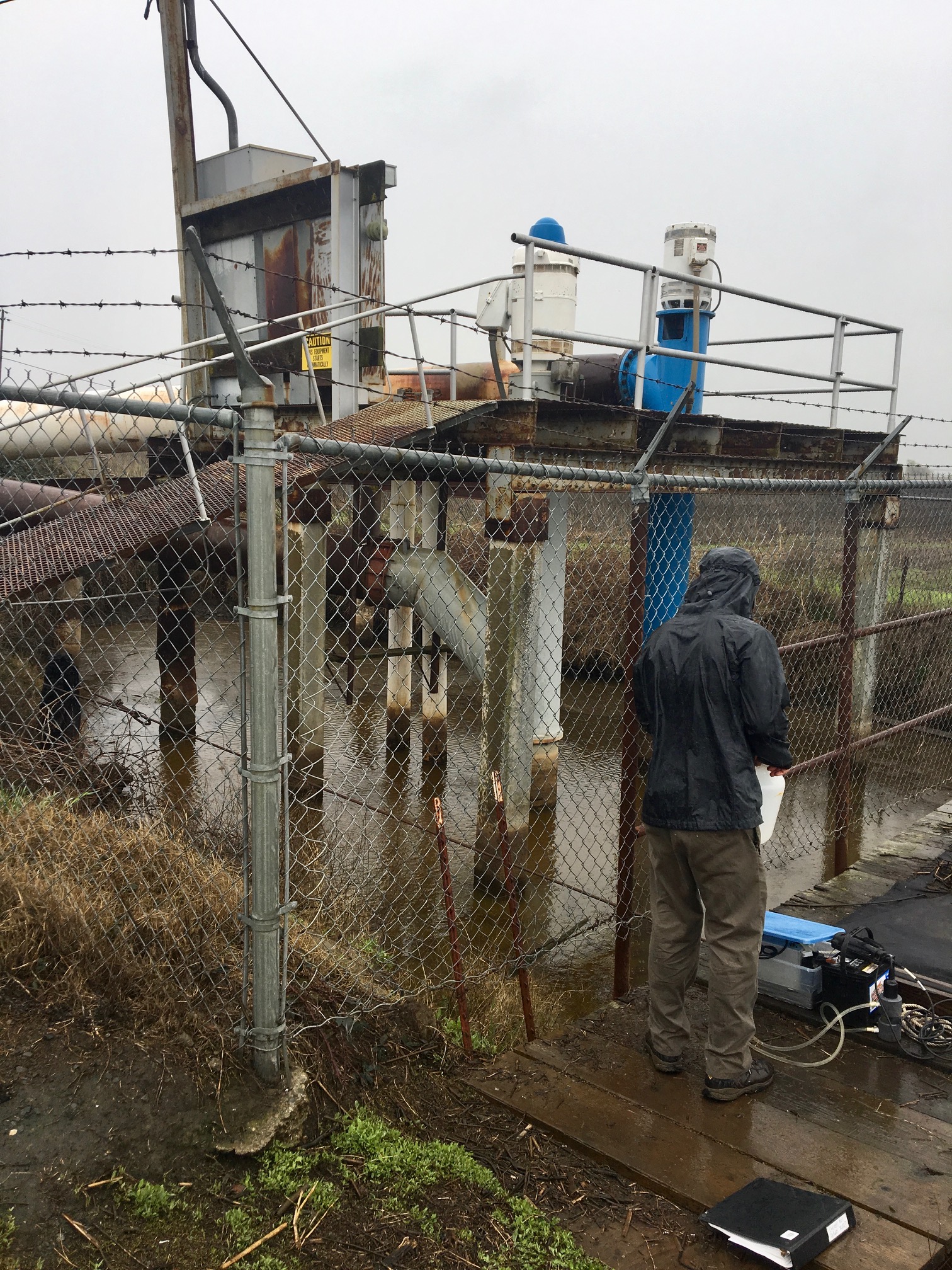Delta Science Fellowship 2017-19
Fellow: Joseph Fackrell, Postdoctoral Fellow, UC Santa Cruz
Research mentor: Adina Paytan, University of California, Santa Cruz
Community mentors: Carol Kendall and Tamara Kraus, U.S. Geological Survey
Background
The Sacramento-San Joaquin Delta receives a heavy influx of agricultural discharge and treated wastewater. Over 200 million gallons per day of treated wastewater flow into the delta from municipal treatment facilities. Although disinfected to prevent disease, this wastewater carries large amounts of carbon, nitrogen, phosphorous and sulfur compounds. These chemicals can affect water quality, algae growth, and the health of animals higher on the food web.
In order to understand the impacts of these compounds in the delta environment, it is important to determine where and when these compounds are originating, and to track them as they flow through delta waterways and into plants and animals.
Project
 This project aimed to characterize the sources of carbon, nitrogen, phosphorous and sulfur compounds from wastewater treatment plant and agricultural discharge in the region. Stable isotope measurement provides elemental signatures that can be used to trace compounds to their sources. Use of this methodology requires that researchers first characterize the stable isotope composition of sources—or fingerprint the suspects.
This project aimed to characterize the sources of carbon, nitrogen, phosphorous and sulfur compounds from wastewater treatment plant and agricultural discharge in the region. Stable isotope measurement provides elemental signatures that can be used to trace compounds to their sources. Use of this methodology requires that researchers first characterize the stable isotope composition of sources—or fingerprint the suspects.
By determining the stable isotope composition of various compounds in wastewater and agricultural drainage sources, this project aimed to build a better understanding of how these compounds are affected by different wastewater treatment agricultural land use practices. In addition, the project has provided a base of knowledge to better understand how these compounds are transported and taken up in the delta environment.
Results
UC Santa Cruz postdoctoral fellow Joseph Fackrell collected water samples at four wastewater treatment facilities, eight agricultural drainage discharge locations, and eight delta waterway sites over a period of sixteen months.. He conducted biogeochemical and stable isotope analyses on all collected samples. Preliminary results of the project identified several isotopic tracers that could be used to distinguish between treated wastewater from different delta water treatment plants. This is likely due to the different treatment methods used by each plant. The project also identified stable isotope tracers that could be used to differentiate between agricultural and wastewater sources in the delta environment.
Management Applications
This research will be used by the U.S. Geological Survey to supplement an investigation of biogeochemical processes in the Sacramento-San Joaquin Delta, and by regulators and policymakers looking for guidance and actionable data related to managing wastewater and agricultural drain discharge in the delta.
The insights from this project into the impacts of wastewater treatment level on biogeochemical and ecological processes in receiving waters could inform decisions regarding wastewater treatment upgrades as well as location and treatment process considerations for new wastewater treatment plants. Additionally, the findings of this project could be used to inform delta island land and water use practices with the goal of mitigating the ecological impacts of agricultural discharge.
Publications and Presentations
Fackrell, Joseph (2018). Stable isotope characterization of C, N, P, and S compounds in treated wastewater effluent discharging to the Sacramento-San Joaquin Delta region. 2018 Bay-Delta Science Conference, Sacramento, CA. September 2018.
Fackrell, Joseph (2019). Stable isotope values of C, N, P, and S compounds in treated wastewater effluent from facilities of varying capacities and treatment practices. ASLO Aquatic Sciences Meeting, San Juan, Puerto Rico, February 2019
Attachments
 Fackrell.Profile_PDF_0.pdf
Fackrell.Profile_PDF_0.pdf